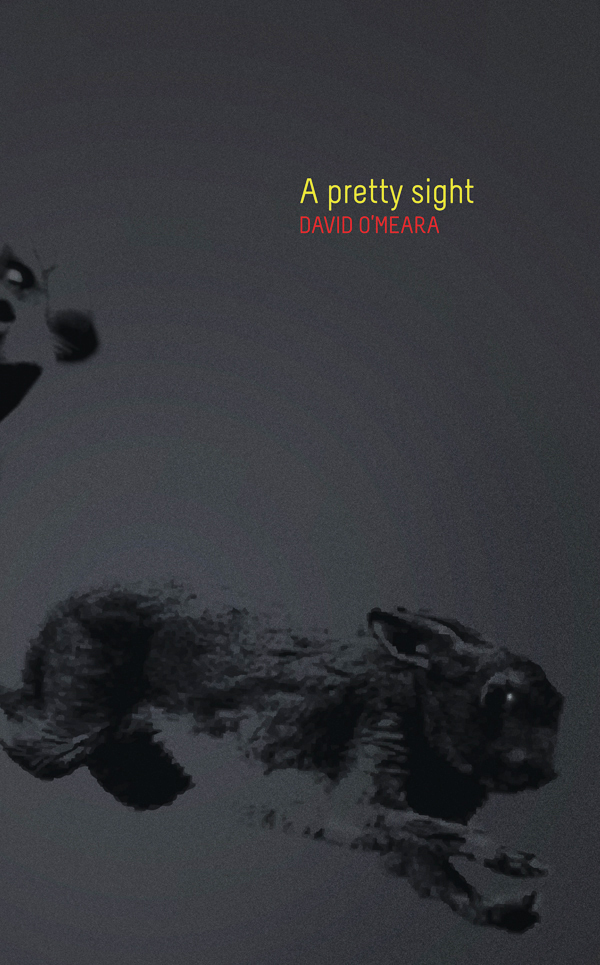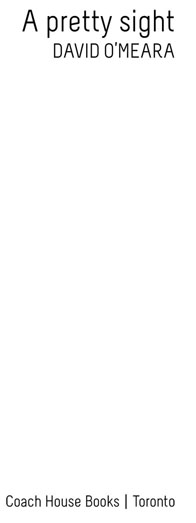A Pretty Sight
Authors: David O'Meara
Tags: #Literature & Fiction, #Poetry, #World Literature




Copyright © David O'Meara, 2013
All rights reserved. No part of this publication may be reproduced or transmitted
in any form or by any means, electronic or mechanical, including photocopying,
recording, or any information storage or retrieval system, without permission in
writing from the publisher.
Distribution of this electronic edition via the internet or any other
means without the permission of the publisher is illegal. Please do
not participate in electronic piracy of copyright material; purchase
only authorized electronic editions. We appreciate your support of the
author's rights.

Published with the generous assistance of the Canada Council for the
Arts and the Ontario Arts Council. Coach House Books also
acknowledges the support of the Government of Canada through the
Canada Book Fund and the Government of Ontario through the
Ontario Book Publishing Tax Credit.
Library and Archives Canada Cataloguing in publication
O'Meara, David, 1968-, author
A pretty sight / David O'Meara.
Poems.
eISBN 978-1-77056-359-9
I. Title.
PS8579.M359P74 2013 cC811′.54 C2013-904124-9
For Dorothy
Wood warps.
Glass cracks.
The whole estate
goes for a song.
The cardboard
we used
to box up the sun
didn’t last long.
- Occasional
- Background Noise
- Socrates at Delium
- The Afterlives of Hans and Sophie Scholl
- Vicious
- Dance
- Umbrage
- Drought Journal
- Terms
- Hare
- Memento Mori
- Circa Now
- ‘In Event of Moon Disaster’
- In Kosovo
- Ten Years
- The Tennis Courts in Winter
- So Far, So Stupid
- Somewhere, Nowhere
- No One
- Reclining Figures
- Loot
- Impagliato
- Talk
- Silkworms
- ‘There’s Where the American Helicopters Landed’
- End Times
- Sing Song
- How I Wrote
- Memento Mori
- Charles ‘Old Hoss’ Radbourn, 1886
- Fruit Fly
- Close All Tabs
- Acknowledgements
- About the Author
As Poet Laureate of the Moon
I’d like to welcome you
to the opening of the Armstrong Centre
for the Performing Arts. I was asked to prepare
a special verse to mark
this important occasion. And I’d be the first
to confess: the assignment
stumped me. Glancing around my workspace’s
dials and gauges, and the moonscape
through triple hermetic Plexiglas,
I struggled to settle on the proper content
to hard-text into the glow of my thought-screen.
In the progress of art and literature, the moon’s
been as constant a theme as rivers or the glare
of the sun, though even after several bowls
of potent plum wine, a T’ang poet would never
have guessed, addressing this satellite across
the darkness, that someone would ever write back.
The Centre itself, I know, isn’t much;
a duct-lined node bolted to the laboratory,
powered by sectional solar panels mounted
on trusses, parked not far from the first
Apollo landing. We live with bare minimum:
cramped, nutrient-deprived, atrophying
like versions of our perishables
in vacuum-pack. The lack’s made my sleep
more vivid. Last night I dreamt I was in
a pool where cattle hydrated, then
fell tenderly apart in perfect lops of meat.
(I see a few of you nodding there in the back.)
So what good will one room do us? Maybe
none. Maybe this streamlined aluminum
will become our Lascaux, discovered by aliens
ages hence, pressing them to wonder what
our rituals meant, what they said of our hopes and fears.
Somewhere in this lunar grind, in the cratered gap
between survival and any outside meaning,
must be the clue to our humanity, the way
Camus once argued the trouble for Sisyphus
wasn’t the endless failure to prop
a rock atop some hill, but the thoughts
he had on the way back down.
Which brings me to the astronauts of Apollo 11.
After snapping the horizon through the lens
of a single Hasselblad, knowing every boot tread
they left was eternal, they’d squeezed
through the hatch of their landing module, shut
and resealed it for return to Earth,
then discovered, due to cramped space
and the bulk of their spacesuits, they’d crushed
the switch for the ascent engine. The rockets failed
to activate. So Buzz Aldrin used part of a pen
to trigger the damaged breaker, toggling until
it fired the sequence for launch. This
was the quiet work of his engineer’s mind.
He kept the pen for the rest of his years,
which is another kind of thinking, akin to
that
slight pivoting
, as Camus would call it,
when we glance backward over our lives.
What we keep in the pause between facts
might be the beginning of art. Which is where
we are in this room tonight. I’ll have to stop there;
the teleprompter is flashing for wrap-up. Following
tonight’s program, I’m happy to announce
an extra ration of Natural Form and
H2O
will be served by the airlock. I think
you’re in for quite a show. So hold on
to your flight diapers as we cue the dancers
who’ve timed their performance to the backdrop
of Earthrise. There it is now in the tinted
north viewpoint. Look at that, folks. To think
they still find bones of dinosaurs there.
Home, my coat just off, the back room
murky and static, like the side altar of a church, so at first
I don’t know what I hear:
one low, sustained, electronic note
keening across my ear. I spot
the stereo glow, on all morning, the cd
at rest since its final track, just empty signal now,
an electromagnetic aria of frequency backed
by the wall clock’s whirr, the dryer droning in the basement,
wind, a lawn mower, the rev and hum of rush hour
pushing down the parkway. I hit the panel’s power button,
pull the plug on clock and fridge, throw some switches,
trip the main breaker, position fluorescent cones to stop traffic.
Still that singing at the edge of things.
I slash overhead power lines, bleed the radiator dry,
lower flags, strangle the cat
so nothing buzzes, knocks, snaps or cries.
I lock the factories, ban mass
gatherings, building projects and roadwork,
any hobbies that require scissors, shears, knitting needles, cheers,
chopping blocks, drums or power saws. It’s not enough.
I staple streets with rows of egg cartons. I close
the airports, sabotage wind farms, lobby
for cotton wool to be installed on every coast. No luck.
I build a six-metre-wide horn-shaped antenna, climb
the gantry to the control tower, and listen in.
I pick up eras of news reports, Motown, Vera Lynn,
Hockey
Night in Canada
, attempt to eliminate all interference,
pulsing heat or cooing pigeons, and yet there it is:
that bass, uniform, residual hum from all directions,
no single radio source but a resonance left over
from the beginning of the universe. Does it mean
I’m getting closer or further away? It helps to know
whether we’re particle, wave or string, if time
and distance expand or circle, which is why
I need to learn to listen, even while I’m listening.
What do I know? At least these
last two mornings since the Boeotian
ranks massed. The whole lot of us
had been camped inside their border, sea
at our backs. We thought we’d soon
be home in Athens. A set of cooking fires
still smoked behind the earthworks, evidence
of a hurried defence at the temple we’d occupied,
an obvious insult. The old seer took
the ram and made a lattice of its throat,
our counter-prayer
for the terror we hoped to inspire.
Across the dawn fields, the enemy trod
through the stripped orchards and wheat,
farmers like us, setting out cold in linen
and cloaks, the well-to-do armoured
for glory out front. After weeks of marching,
the suddenness of it: the general’s shouts,
his interrupted speech passed down the lines,
our pipe marking the pace, and far off,
their war cry rending the November air
like a thousand sickles. The black doors
of each empty farmhouse watched our lines
clatter through stubbled stalks,
my arm already heavy from the shield.
‘Stay tight, stay tight,’ we called across
the bronze rims, cursing and half out of breath.
Then a new shout went out
and we spilled up the ridge at a run
into the Thebans’ spear thrusts.
In the push, there’s little room for a view;
dust scuffed up by thousands of men
gagged the air. Best to trust in detail,
watch for sharp jabs at your throat,
stay flush with the column, and above all else
don’t fall. Not so easy with the friendly shields
pressing behind, and reaped furrows
snatching your balance. Our phalanx
held, shoving, and forced the Thebans
back over ground they’d claimed at midday.
But there was a too-easy feel to it,
as if we expected they’d break, and we’d slide
through their lines like lava from Hades.
Word spread of horsemen on the hill.
A trick? Who knew? We were servants
to rumour. A few turned and ran,
then the rest. Then I did too.
‘Don’t show them your backs,’ I cried
to a group, shopkeepers from the look
of them. ‘Do you want wounds
there
when your corpse is exchanged?’
That turned them around.
We still had our swords. Scavenging cracked
spear-lengths to keep the cavalry off,
we backpedalled over corpses, boulders
and olive roots into dusk. That was two days ago.
More rumours follow us to Attica: Hippocrates
dead, how we were outnumbered,
whispers of the slaughter chittering in our ears
like broken cart wheels. Though we know the direction
home, we stall, not from plague that still strays
in its streets, but the shame of retreat.
Night, the cooking fires again.
We who are left, battered stragglers, scoop gruel
and wait for orders to seek out our dead.
Now, on the edge of the firelight, a rhapsode
recites an ancient passage, his voice recalling Troy,
the dark-beaked ships and grief for Patroclus.
We were brave enough, but couldn’t hold.
What use is a story or a song?
